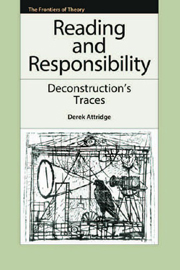Book contents
- Frontmatter
- Contents
- Acknowledgements
- Series Editor's Preface
- Introduction
- 1 Derrida, Deconstruction and Literary Criticism
- 2 Deconstruction Today: Literature, Postcolonialism and the Secret
- 3 Following Derrida
- 4 The Impossibility of Ethics: On Mount Moriah
- 5 Arche-jargon
- 6 Deconstruction and Fiction
- 7 Posthumous Infidelity: Derrida, Levinas and the Third
- 8 Roland Barthes's Obtuse, Sharp Meaning and the Responsibilities of Commentary
- 9 Nothing to Declare: J. Hillis Miller and Zero's Paradox
- 10 Radical Atheism and Unconditional Responsibility
- 11 The Place of Deconstruction: A Conversation with Jean-Michel Rabaté
- Bibliography
- Index
2 - Deconstruction Today: Literature, Postcolonialism and the Secret
Published online by Cambridge University Press: 12 September 2012
- Frontmatter
- Contents
- Acknowledgements
- Series Editor's Preface
- Introduction
- 1 Derrida, Deconstruction and Literary Criticism
- 2 Deconstruction Today: Literature, Postcolonialism and the Secret
- 3 Following Derrida
- 4 The Impossibility of Ethics: On Mount Moriah
- 5 Arche-jargon
- 6 Deconstruction and Fiction
- 7 Posthumous Infidelity: Derrida, Levinas and the Third
- 8 Roland Barthes's Obtuse, Sharp Meaning and the Responsibilities of Commentary
- 9 Nothing to Declare: J. Hillis Miller and Zero's Paradox
- 10 Radical Atheism and Unconditional Responsibility
- 11 The Place of Deconstruction: A Conversation with Jean-Michel Rabaté
- Bibliography
- Index
Summary
What would a map of deconstruction today look like? If deconstruction is, as both its enemies and its friends have claimed, a kind of virus and we were able to produce – on the model of the colourful mappings one might see in a treatise on global diseases – a large chart of the intellectual world with its presence marked in red, how would the result appear?
Before attempting to answer this question, we have to be sure we know what deconstruction is, or, if this is not possible (because deconstruction might be said to cause problems for the act of definition), at least in what sense the term is to be used in this book. It will help to begin by following Jacques Derrida, writing in ‘Some Statements and Truisms’, in distinguishing between deconstruction and deconstructionism. The latter is a word often used by opponents of Derrida's work, or by those who are ignorant of it; deconstructionism is practised, such people tell us, by deconstructionists, who believe that there is no such thing as meaning, or truth, or knowledge (and often, by implication, morality). (After his death, Derrida was called in some newspapers ‘The father of deconstructionism’.) But it's also a useful word to apply, as Derrida himself does, to a certain critical methodology – usually addressed to literary texts – that was very popular in English-speaking cultures in the late 1970s and 1980s, notably the United States, where it functioned as a kind of Indian summer prolonging the reign of New Criticism.
- Type
- Chapter
- Information
- Reading and ResponsibilityDeconstruction's Traces, pp. 34 - 50Publisher: Edinburgh University PressPrint publication year: 2010



